
Bejeweled is a 2000 match-three video game developed and published by PopCap Games. Bejeweled involves lining up three or more multi-colored gems to clear them from the game board, with chain reactions potentially following. The game was inspired by a similar browser game titled Colors Game discovered by the PopCap team in 2000, who, at the time, consisted of John Vechey, Brian Fiete, and Jason Kapalka. Originally titled Diamond Mine and released in 2000 as a browser game on the team's official website, Bejeweled was later licensed to be hosted on MSN Gaming Zone under its current name. PopCap released a retail version titled Bejeweled Deluxe in May 2001.

Dungeon Siege is an action role-playing game developed by Gas Powered Games and published by Microsoft in April 2002, for Microsoft Windows, and the following year by Destineer for Mac OS X. Set in the pseudo-medieval kingdom of Ehb, the high fantasy game follows a young farmer and her companions as they journey to defeat an invading force. Initially only seeking to warn the nearby town of the invasion of a race of creatures named the Krug, the farmer and the companions that join her along the way are soon swept up in finding a way to defeat another race called the Seck, resurgent after being trapped for 300 years. Unlike other role-playing video games of the time, the world of Dungeon Siege does not have levels but is a single, continuous area without loading screens that the player journeys through, fighting hordes of enemies. Also, rather than setting character classes and manually controlling all of the characters in the group, the player controls their overall tactics and weapons and magic usage, which direct their character growth.
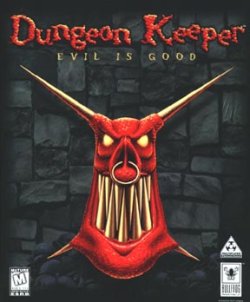
Dungeon Keeper is a strategy video game developed by Bullfrog Productions and released by Electronic Arts in June 1997 for MS-DOS and Windows 95. In Dungeon Keeper, the player builds and manages a dungeon, protecting it from invading 'hero' characters intent on stealing accumulated treasures, killing monsters and ultimately the player's demise. The ultimate goal is to conquer the world by destroying the heroic forces and rival dungeon keepers in each realm. A character known as the Avatar appears as the final hero. Dungeon Keeper uses Creative Technology's SoundFont technology to enhance its atmosphere. Multiplayer with up to four players is supported using a modem, or over a local network.

Dungeon Keeper 2 is a strategy game developed by Bullfrog Productions and published by Electronic Arts in 1999 for Microsoft Windows. In the sequel to Dungeon Keeper, the player takes the role of a 'dungeon keeper', building and defending an underground dungeon from the would-be heroes that would invade it, as well as from other keepers. In the campaign mode, the player is charged with recovering the portal gems from each area in order to open a portal to the surface. The player can also construct a dungeon without strict objectives, and multiplayer is supported over a network.
Robinson Technologies is a Japanese video game developer founded by Seth Robinson. The company produced the BBS door games Legend of the Red Dragon, Planets: The Exploration of Space and Growtopia, an experimental multiplayer creative sandbox created as a collaboration with Hamumu Software, released in 2013 for iOS, Android, Microsoft Windows, and macOS.
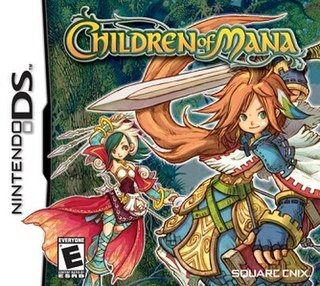
Children of Mana is a 2006 action role-playing game for the Nintendo DS handheld console. It was developed by Square Enix and Nex Entertainment, and published by Square Enix and Nintendo. It is the sixth game of the Mana series—following 2003's Sword of Mana—and the first entry in the World of Mana subseries. Set in a high fantasy universe, Children of Mana follows one of four young heroes as they combat an invasion of monsters and learn about the cataclysmic event that killed their families.

Castle Crashers is a beat 'em up video game developed and published by The Behemoth for the Xbox 360. It was originally released on August 27, 2008 by Microsoft Game Studios via Xbox Live Arcade as part of the Xbox Live Summer of Arcade. A PlayStation 3 version was released in North America on August 31, 2010, and November 3, 2010, in Europe via the PlayStation Network. A Microsoft Windows and OS X version, exclusive to Steam, was released on September 26, 2012. The game is set in a fictional medieval universe in which a dark wizard steals a mystical crystal and captures four princesses. Four knights are charged by the king to rescue the princesses, recover the crystal, and bring the wizard to justice. The game includes music created by members of Newgrounds.

Doom is a 2016 first-person shooter video game developed by id Software and published by Bethesda Softworks. The game is the first major installment in the Doom series since 2004's Doom 3 and was a reboot of the franchise. It was released for PlayStation 4, Windows, and Xbox One in May 2016. A port for Nintendo Switch was co-developed with Panic Button and released in November 2017, and a version for Google Stadia was released in August 2020. Players take the role of an unnamed space marine, known as the "Doom Slayer", as he battles demonic forces within an energy-mining facility on Mars and in Hell.

Cut the Rope is a franchise of physics-based puzzle video games developed and published by ZeptoLab. It consists of the original game Cut the Rope (2010) published by Chillingo, Cut the Rope: Holiday Gift (2010), Cut the Rope: Experiments (2011), Cut the Rope: Time Travel (2013), Cut the Rope 2, My Om Nom, Cut the Rope: Magic (2015), Cut the Rope Remastered (2021), Cut the Rope Daily (2023), and Cut the Rope 3 (2023).

Infinity Blade was an action role-playing game developed by Chair Entertainment and Epic Games and released through the Apple App Store on December 9, 2010. It was the first iOS video game to run on Unreal Engine 3. In the game, the unnamed player character fights a series of one-on-one battles in a derelict castle to face the immortal God King. When in battle, players swipe the screen to attack and parry, and tap the screen to dodge and block enemy attacks. Upon defeat, the player restarts the game as the character's descendant with the same items and experience level.
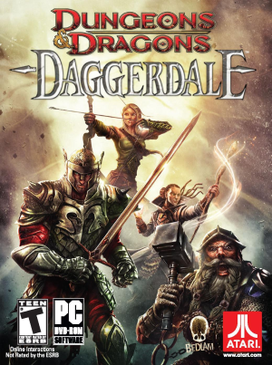
Dungeons & Dragons: Daggerdale is an action role-playing video game developed by Bedlam Games and published by Atari Interactive. The game includes both single and co-operative multiplayer modes and is set in the Forgotten Realms.
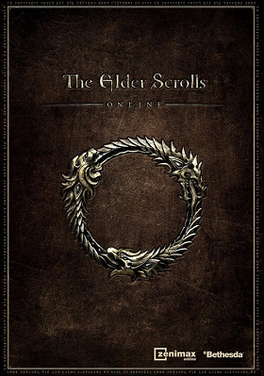
The Elder Scrolls Online, abbreviated ESO, is a massively multiplayer online role-playing game (MMORPG) developed by ZeniMax Online Studios and published by Bethesda Softworks. The game is a part of the Elder Scrolls series. It was released for Windows and macOS in April 2014, for PlayStation 4 and Xbox One in June 2015, and for PlayStation 5 and Xbox Series X/S in June 2021.

Adventure Time: Explore the Dungeon Because I Don't Know! is a 2013 action-adventure game developed by WayForward Technologies and published by D3 Publisher in North America and in PAL regions by Namco Bandai Games for PlayStation 3, Xbox 360, Windows, Nintendo 3DS, and Wii U. It is the second game based on the animated television series Adventure Time, following Hey Ice King! Why'd You Steal Our Garbage?!! (2012). The game includes voice acting from major characters and four-player cooperative multiplayer, except in the 3DS version, which has no multiplayer.

Angry Birds Go!, also formatted as Angry Birds Go, was a kart racing game and the eighth game in the Angry Birds video game series. The game was co-developed by Rovio Entertainment and Exient Entertainment, and was released on December 10, 2013. The game was compatible with Hasbro Telepods that will allow the player to summon a specific kart. The game's tracks are located on the 3D-rendered Piggy Island. The game also featured upgradable karts and unique powers for each character.

Dungeon Keeper was a freemium mobile massively multiplayer online strategy video game developed by Mythic Entertainment and released by Electronic Arts in 2014 for iOS and Android. A reboot to the Dungeon Keeper series, players construct and manage a dungeon, recruiting minions to run it, although the gameplay had a tower defence style, featuring frequent raids of others' dungeons and the defense of the player's. Players could participate in tournaments and leagues online.

The Escapists 2 is a strategy role-playing video game developed by Mouldy Toof Studios and published by Team17. It is the sequel to The Escapists (2015) and it was released worldwide for Linux, macOS, PlayStation 4, Windows, and Xbox One in August 2017. Nintendo Switch and mobile phones versions were released in 2018 and 2019, both iOS and Android respectively.
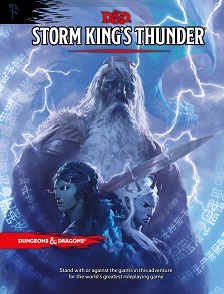
Storm King’s Thunder is an adventure module for the 5th edition of the Dungeons & Dragons fantasy role-playing game.
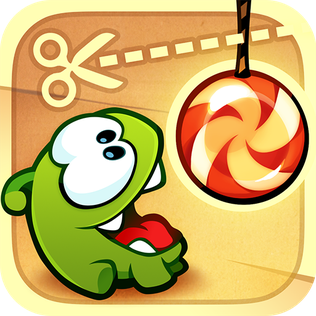
Cut the Rope is a physics-based puzzle video game developed by ZeptoLab and published by Chillingo for iOS, Android, Windows Phone, web browsers, Nintendo DSi, and Nintendo 3DS. The game was succeeded by Cut the Rope: Experiments in 2011 while a direct sequel, Cut the Rope 2, was released in 2013.

Mirror's Edge is a side-scrolling platform game developed by IronMonkey Studios and published by Electronic Arts. It was released for iPad and iPhone in 2010, and for Windows Phone in 2012. The game is a prequel to the original Mirror's Edge, setting the scene about Runners and the city's shady corporations. It received very positive reviews from critics.

Shovel Knight Pocket Dungeon is a roguelike puzzle game co-developed by Vine and Yacht Club Games, and published by Yacht Club Games. A spin-off of the platform game Shovel Knight, the player takes control of the namesake adventurer as he becomes trapped within a magical artifact, the Pocket Dungeon, and is forced to fight his way out while battling other knights who befell the same fate.
















